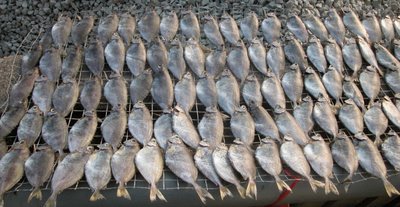
We set out from the port of Aberdeen in the heat of late afternoon, heading south east to the Po Toi islands on the sea border with China. Aberdeen used to be a fishing village. Used to be. But that was before Hong Kong became the world's gateway to communist run capitalism. Where village women once deftly piloted fishing junks around the harbour, there were now lines of white motor launches, looking more like marine apartment blocks than boats. We passed one called "Floating Asset" with a man in swimming trunks, lounging in the stern cabin, watching the business news on a wide screen TV.
We were turning seawards in an old wooden cabin cruiser, broad of beam and as practical as an elderly amah (Chinese maid). I sat in the bow where you could watch the heading and see the milk green South China Sea part and roll. The sun went down as we passed the old fort at Stanley where what was left of the British garrison surrendered to the Imperial Japanese army in 1942. I sipped a Chardonnay, lay back and thought of England.
Po Toi was almost asleep as we entered the bay. About ten years ago, the sea people's ancient village had been smashed by a typhoon; the fist of the otherwise benevolent sea goddess, Tin Hau. Most of the locals took this as a sign to move to the air-conditioned comfort of the high rises of Hong Kong island where they traded fishing for land speculation, their rusty boats for Mercedes and their nets for digital phones. Those that remained were mostly old, with crinkled leather faces which peered from the small brick houses from which dim yellow lights still flickered. Tattered red and gold warnings to departed ghosts flapped on broken walls. A tap dripped, while in the distance, a dog barked. We walked with care, following the path as it wound up the hill through the tangled, darkening trees and down to the little white sand beach.
We were the only people at the restaurant, if that is what you call a roof above and a scrubbed wooden floor below. Our dinner; prawns, lobster and cod, swam innocently in plastic tubs ominously close to the glowing grill. Fresh Chinese seafood is a pleasure long remembered, particularly when you wash it down with Tsingtao, a german beer made by the Chinese for apparently medicinal purposes.
There were local dogs on the beach when I went walking. They were obsequiously friendly as only canines can be. They liked me , a foreign devil; on sight. But when the Chinese boatman from our launch tried to land, they went for him without a thought. I called them back and they ran to me, tails wagging, mouths wide with idiot dog grins. The boatman edged up the shore. The pack turned and snarled. I threw them a stick and they took off after it. The boatman saw his chance, jumped from his dinghy and made a run for it. The dogs were after him in a flash, howling and snapping, as they chased him up a small tree. I called them back. They licked my hand. The boatman jumped out of the tree and made for the restaurant . But was too slow for them. He was back up the tree kicking dogs as they jumped to bite his boots.
I thought this was decidedly odd. Why would a pack of dogs on an obscure Hong Kong island prefer visiting Europeans to native Chinese? Were they confused about who their masters were? Or was there something more sinister? Perhaps these were the imperialist running dogs we heard so much about during the Cultural Revolution? These political animals, much maligned by Mao, had undermined the Great Leap Forward, brought down the Gang of Four and were perhaps among the foreign agents now blamed by Xinhua for the Tiananmen Square "incident". Maybe they had been hiding out at Po Toi for all these years, striking fear into the hearts of all those who loved Mother China. Let's hope that the communist party aristocracy and their entourage of People's Liberation Army investment consultants, Russian hookers, and Shanghai billionaires don't land here after the handover, looking for a feed. They might get a surprise they didn't bargain with Ms Thatcher for.
